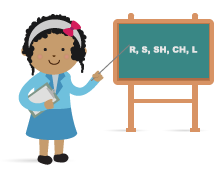
Language disorders
can be classified in three different ways: Expressive
Language Disorder (ELD), Receptive Language Disorder (RLD) or Expressive-Receptive Language Disorder (ERLD).
Children with Expressive Language Disorder do not have problems producing sounds or words, but have an inability to retrieve the right words and
formulate proper sentences. Children with Receptive Language Disorder have difficulties comprehending spoken and written language. Finally, children with Expressive-Receptive Language Disorder will exhibit both kinds
of symptoms.
Children might be born with these disorders or
they may be acquired due to brain trauma. In adults, language disorders may also be the result of a stroke.
Children with
Expressive Language Disorder generally do not have difficulty speaking words or with articulation. However, formulating the right sentence or
set of words to describe things or to express an emotion is difficult because they cannot retrieve the correct
word when necessary. Grammar is a hard concept for them
to understand and they may not use of articles (a, the), prepositions (of, with) and plurals. An early symptom is
delay in the early stages of language, so if
your child takes longer to formulate words or starting to babble, it can
be a sign of ELD.
Children with Receptive Language Disorder may
act like they are ignoring you or just
repeat words that you say; this is known
as “echolalia." Even when repeating
the words you say, they may not understand.
An example of this is if you say, “Do you want to go to the park?” and they respond with the exact phrase and
do not answer the question. They
may not understand you or the fact that you asked them to do something.
Children with Expressive-Receptive Language
Disorder can have a mix of these symptoms.
For all Language Disorders, seeking a advice from a professional speech
therapist as soon as you realize that your child may have a problem
is an important first step. If you
think your child is suffering from Receptive Language Disorder, having an audiology (hearing) test done is also a good idea. If
hearing is not an issue, regular lessons with a speech
language pathologist (SLP) will help strengthern your child's language skills. The SLP will work with your child in a clinic or school setting using various
techniques to extend your child’s vocabulary and will use repetition and emphasis on targeted words
to help your child determine word definition.
A SLP may help a child with Expressive Language Disorder to better develop his vocabulary and reinforce the understanding of verbs and nouns. Narrating actions and using flashcards to
give visual definition to objects helps build vocabulary skills.
Parents can work at home with their children by
narrating their everyday actions, reading
and telling stories with their children. Involving kids in everyday activities while telling them what you are doing can be a great deal of help.
Unfortunately, Speech Buddies do not help with language
disorders as correct sound production is generally not an issue. If a child with a language disorder also has difficulty producing sounds correctly (articulation), then Speech Buddies may be a more applicable part of the treatment plan.
Articulation Disorder, Apraxia of Speech, Autism, Cerebral Palsy, Cleft Palate, Down syndrome, Fragile X Syndrome, Speech Delay, Stuttering
References:
http://www.speechbuddy.com/blog/speech-disorders-2/receptive-language-disorders/
http://www.speechbuddy.com/blog/speech-disorders-2/coping-with-expressive-language-disorders/\
http://www.asha.org/public/speech/disorders/
http://en.wikipedia.org/wiki/Receptive_language_disorder

Please contact us for immediate help with your request.
![]() 1-866-247-8030
1-866-247-8030
![]() info@speechbuddies.com
info@speechbuddies.com
Outside of business hours? You will be contacted as soon as we are open.
To choose a new speech therapist, please contact us.
![]() 1-866-247-8030
1-866-247-8030
![]() info@speechbuddies.com
info@speechbuddies.com
Outside of business hours? You will be contacted as soon as we are open.
You can reschedule your appointments anytime. We ask that you give us at least 24 hours notice to avoid any unnecessary fees or complications. You will not be charged for any of your sessions until the day of that appointment.
Your speech therapist likely gave you a recommended treatment plan in your first session. If not, make your best guess – you can always modify your package later.
Your message has been sent. or close this window to continue.
Your discount code will be sent to your email shortly.
 I am a parent
I am a parent
 I am a Speech Therapist
I am a Speech Therapist